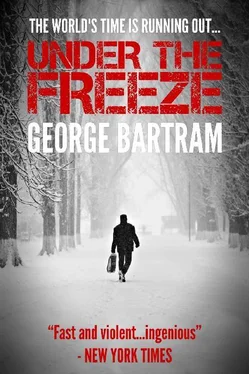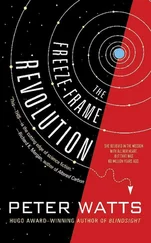“Tell me your name,” he said.
Tarp tried to speak. No sound wanted to form in his throat. “Ta—” He took a breath. “Tarp.” He shivered violently.
“Tell me in Russian why you are in Moscow.”
Beranyi was simply trying to find if he could talk and think. He knew all these answers, as Tarp had known the answers to so many of the questions he had asked the others.
“I came — to — look for — look for—” He had to swallow. He sucked air in, trying to fill his burning lungs. “Maxudov. Stolen plutonium.”
“Good. I am Beranyi. You have already guessed that. You wanted to meet with me; well, we meet. I am not like the others, you see. I do not choose to tell you anything. Instead, I choose that you tell me. Once you have told me things, you will be quite safe. But you understand your position here. You are alone. You can hardly walk; you are very sick. If you do not work with me, you will be beaten. And there are worse things, to be sure.” He passed his right hand over his cheek, making a scratchy sound that Tarp associated with not shaving. Maybe it was late in the day, or even night. “Tell me now in Russian that you understand.”
“I understand.”
“Good. Now, we begin.”
He pulled a chair closer and sat down, taking a dingy notebook from a pocket as he did so. He uncapped a plastic pen. He took a pair of plastic-rimmed glasses from a case and put them on. “Begin with Telyegin. You saw him when, please?”
“Telyegin?” He had to concentrate fiercely to remember who Telyegin was. Old man in the wheelchair . He hated me . In the dacha. Yes , that one . He began to talk, the words disjointed and his voice hoarse, but Beranyi paid no attention to his condition. He made notes. Tarp shook so badly sometimes that he thought he would fall out of the chair. Beranyi called the others into the room and said, “Do something with him, he keeps falling.” The Mongol put a chair on each side of Tarp and draped his arms over them so that they supported him. Beranyi jerked his head and the man left.
“Feodor Strisz next. That is correct, is it not — Strisz next?”
Tarp fought for air and could manage only panting breaths. His head was down on his chest. His arms were shaking on the chairbacks, yet there was a film of sweat matting the hair on his chest and belly, as if he had been rubbed with grease.
Beranyi went on. He would let Tarp talk until he ran out of voice; then he would backtrack and ask a question from another direction. The character named Strisz in the Theatrical Novel — who had brought that up? Why? Did Strisz laugh then? Did Strisz mention Cuba? What did he say? Why did he say that? What was his tone of voice?
Tarp woke up in his cell. He did not remember it ending, but here he was. Maybe I just stopped . Maybe I died .
He was not shivering now; in fact, he was hot. He had new pains across his shoulders that were not the result of the beating, but of fever.
Tarp put a foot on the floor, then a hand, and then he let himself down and crawled to the corner. He squatted over the hole, smelling the sickness of his body. There was no paper, no towel. He slowly raised his left hand to the faucet above him, only to find that he lacked the strength to turn it on. He gave up and crawled back to the iron cot but had to lie next to it on the floor because he could not get up on it.
This isn’t fatal , he told himself. This is some kind of flu . They do ads about it on television . Everybody gets it . He knew that that was not quite true. He had never been this sick. Common ailment . Keeps doctors in business . Keeps doctors’ wives in fur coats . Keeps doctors in the Republican party . Without flu , doctors would have to go on welfare . Very common . What he had was not common, but it might become so if the Soviets used it as an ABC agent. Perhaps they would try it out in Afghanistan or Southeast Asia, where respiratory infections really cut a swath. Take two aspirin and go to bed . He looked up at the underside of the bed he couldn’t get into.
This is the preliminary . When I’m weak enough , he’ll go after me with chemicals . Sodium pentathol , maybe . The trouble with the chemicals that made people talk was that they also made some people crazy or silly or mute with depression — or dead. I know what my choices are . It would have been romantic to think of it as a battle of wills with Beranyi, but all the will that he had he needed simply to stay sane.
The one thing he could do was fence off some of what he knew. Perhaps he could protect Repin. Perhaps he could keep Pope-Ginna to himself. It seemed important still to keep the Argentine part of it — Schneider, Pope-Ginna, the Prinz von Homburg — separate and to keep it, if possible, from the Soviets. Unless Beranyi were Maxudov, in which case he would be learning only what he already knew. Or would he ? Even in his fever, that made him concentrate. What if Maxudov doesn’t know about them ?
He would protect Jules Laforet somehow. And Hacker, because he would be no use at all once the Soviets learned he had been turned back.
And the amenities at the New Monroe . I don’t think I want Beranyi staying there .
He concocted a reality. In his invented reality, Repin was dead in the wreckage of the Aeroflot plane; Hacker was believed to be a loyal American; Jules Laforet had not figured in his work at all. He had never heard of Pope-Ginna. He thought of that for a while. He had talked to two of the others about Pope-Ginna. Maybe he could retreat to the code name Penguin and give that to Beranyi. So, in his new reality, he had heard of an agent called Penguin who was a go-between with Argentina. That, however, gave Beranyi access to the little he knew about Argentina, or it would if he were made vulnerable by chemicals and if he hadn’t tied up all the loose ends. Then it became necessary to invent a recent past in which there was no Argentina. Only somebody called Penguin.
Tarp told it all to himself as if it were a story, from the moment when Repin appeared at the Scipio’s dock. He tried to imagine every detail. He cut events totally — Argentina, the French safe house — and made up new ones to cover the gaps in time. Places, dialogue, clothes, faces. Everything had to be right. It had to be more right, more precise, and more believable than reality. It was his revenge on Beranyi, arising from old habit and from conviction and out of an instinct for survival, for which it was necessary to hold something back.
“Take him to room seven.”
Beranyi quizzed him about Mensenyi and Falomin. The routine was the same, with no chemicals used. Tarp must have looked a little better, however, because the doctor gave him another injection.
Then he was in his cell again, throwing up. There was blood in his urine. At some point — it was after his second meeting with Beranyi — he tried to escape and the two guards beat him again. Somehow one of his teeth was knocked loose. He remembered the taste of the blood and the seemingly huge, boulderlike size of the tooth in his mouth. And then a dentist was working on him. He made Tarp laugh. I don’t need a dentist ; I need a mortician . He tried to say that but he couldn’t make words. The dentist shouted at him. He was not in his cell then. He was someplace clean that smelled like carbolic acid.
Читать дальше












